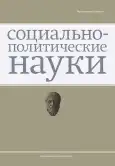Information - a New Weapon of Mass Destruction
- Authors: Selin I.A.1, Fentisov D.A.2
-
Affiliations:
- The Newspaper “Trud”
- “Southern Alliance Corporation”
- Issue: Vol 12, No 2 (2022)
- Pages: 15-20
- Section: Articles
- URL: https://journal-vniispk.ru/2223-0092/article/view/146943
- DOI: https://doi.org/10.33693/2223-0092-2022-12-2-15-20
- ID: 146943
Cite item
Abstract
Keywords
Full Text
##article.viewOnOriginalSite##About the authors
Ivan A. Selin
The Newspaper “Trud”
Email: 9647627420@bk.ru
шеф-редактор сайта Газеты «Труд» Moscow, Russian Federation
Dmitriy A. Fentisov
“Southern Alliance Corporation”
Email: op3@kubsok.ru
commercial director Republic of Adygea, Russian Federation
References
- The Criminal Code of the Russian Federation. Fed. Law No. 63-FZ of 13.06.1996 (as amended on 09.03.2022). URL:https://www.ugolkod.ru/statya-355
- Vedmesh N.A. Blue whale - tasks that kill. Psychology and Psychiatry. Child psychology. 2016. (In Rus.) URL:https://psihomed.com/siniy-kit-zadaniya-kotoryie-ubivayut/
- Grabelnikov A.A. Mass information in Russia: from the first newspaper to the information society. Moscow: RUDN, 2015. 330 p.
- Kovanov P.I. Word - weapon. 2nd ed., suppl. Moscow: Soviet Russia, 2016. 208 p.
- Larina E.S., Ovchinsky V.S. Cyber wars of the XXI century. What Edward Snowden kept silent about. Moscow: Book World, 2014. 352 p.
- Larionova D.P. Information as a social weapon. Electronic Bulletin of the Rostov Socio-Economic Institute. 2015. (In Rus.) URL:https://cyberleninka.ru/article/n/informatsiya-kak-sotsialnoe-oruzhie
- Makarenko S.I. Information weapons in the technical sphere: Terminology, classification, examples. Control, Communication and Security Systems. 2016. Pp. 292-376. (In Rus.) URL:https://sccs.intelgr.com/archive/2016-03/11-Makarenko.pdf
- Novikov V.K. Information weapons - weapons of modern and future wars. 2nd ed., suppl. Moscow: Hotline - Telecom, 2018. 262 p. URL:https://biblioclub.ru/index.php?page=book&id=253581
- Pocheptsov G.G. Information wars in cyberspace. Psy-factor. 2018. (In Rus.) URL:https://psyfactor.org/psyops/infowar19.htm
- Sazonova K.L. The modern international legal status of we-apons of mass destruction and issues of international responsibility of States for their use. National Security / Nota Bene. 2018. (In Rus.) URL:https://cyberleninka.ru/article/n/sovremennyy-mezhdunarodno-pravovoy-status-oruzhiya-massovogo-unichtozheniya-omu-i-voprosy-mezhdunarodnoy-otvetstvennosti-gosudarstv
- Salpagarov A.A. Problems of proliferation of weapons of mass destruction. Young Scientist. 2015. No. 10 (90). Pp. 965-966. (In Rus.) URL:https://moluch.ru/archive/90/18894/
- Townsend S. Adrian Mole and weapons of mass destruction. Moscow: Phantom Press, 2018. 512 p.
- Usoltsev V.I., Zhuravlev O.G. New types of weapons of mass destruction. Young Scientist. 2022. № 10 (405). Pp. 213-228. (In Rus.) URL:https://moluch.ru/archive/392/86050/
- Information in modern society as a weapon of mass destruction. 2019. URL:https://www.единыйурок.rf/index.php/press/item/664-57
- Thaler R.H., Sunstein C.R. Nudge: Improving decisions about health, wealth, and happiness. New Haven, CT: Yale University Press, 2008. 293 p.
Supplementary files








